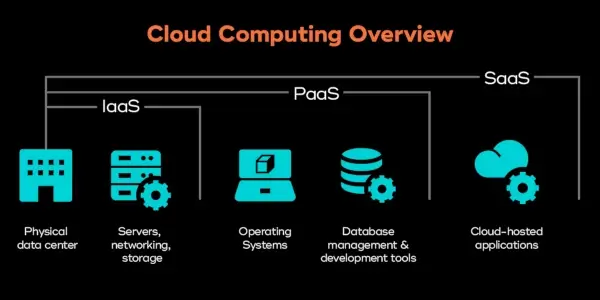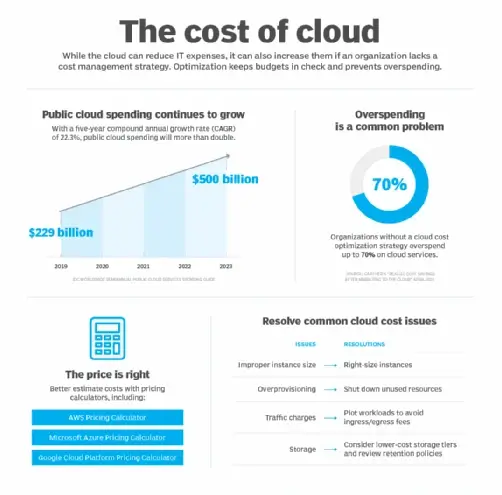
At one time, tech advancements were a major drain on small businesses.
Housing your software and digital assets in-house once created a financial nightmare many emerging companies couldn't handle. On top of that, threats to security and a complete lack of flexibility made establishing a foothold challenging. That was especially true when going up against established industry heavy hitters.
But, as it tends to do, technology has evolved, becoming smarter, more accessible, more affordable, and more flexible. One of the biggest advancements in the small business sector has been the rise of cloud computing.
By hosting digital assets online, small business owners have had an easier time setting up their online infrastructure and remotely monitoring servers and network components without going broke.
But what is the goal of cloud computing? And how can it help small businesses save in several key areas? Read on to find out.
What is cloud computing?
Cloud computing refers to accessing digital resources online in an on-demand format.
Not so long ago, businesses had to host all digital assets in-house. These assets include servers, databases, software, and computing power. It represented a substantial financial drain for emerging companies and required a lot of direct management and human resources.
On top of that, because of local storage, business owners and their employees had no access to these assets outside the office. This issue made many of today's conveniences, like remote work, practically impossible.
Cloud applications have created an affordable and flexible way to gather the digital assets emerging businesses need to hit the ground running. We're now seeing robust digital solutions managed online by third-party cloud service providers and accessed on demand by companies that need them.
Customer data platforms (or CDPs), for example, are an essential tool for small businesses adopting cloud computing. These platforms offer several benefits, including significant cost savings, flexibility, and security.
With CDPs, companies can centralize and efficiently manage customer data, thus providing quick, easy, and secure access to the information they need.

There are three different types of cloud computing, which include:
- Software as a service (SaaS)
- Platform as a service (PaaS)
- Infrastructure as a service (IaaS)
How can cloud computing benefit your small business?
By now, you should understand what cloud computing is. That means we can safely dive into why this advancement represents a more powerful and effective solution for small businesses trying to gain a foothold in their respective industries.
Cost Saving
When it comes to small business operations, every penny counts. Cloud computing services can offer significant cost savings by reducing the need for expensive onsite hardware and IT staff.
At one time, to create the digital infrastructure needed to remain competitive, businesses needed to have onsite servers to house their data. They also required locally installed software solutions. Finally, a full-time, salaried IT professional managed the entire network onsite.
Then along came cloud computing. Now, businesses could house data storage and software online through a community cloud service like Google Cloud. The overwhelming cost of physical equipment and locally installed software that'd eventually need updates was no more.

Through cloud computing, businesses pay subscription costs. That means access to constantly updated online resources that saw new advancements implemented by third-party cloud vendors.
But that's not the only way cloud computing can help financially. Did you know that cloud-based services can also boost your sales productivity? Integrating lead scoring software into your cloud-based operations lets you quickly identify and prioritize the most valuable leads for follow-up.
Coupled with other cloud computing examples like CRM, email marketing platforms and marketing automation software, businesses are reaching more customers than ever. And they're doing this with a much lower investment and higher returns.
Enhanced security
One of the benefits of cloud computing services for small businesses is security. Cloud providers offer various features and tools to protect your data and applications from cyberattacks, such as encryption, firewalls, backups, and multi-factor authentication.
Multi-factor authentication is an access management method of verifying a user's identity by requiring more than one piece of evidence.
This security measure could mean entering a password online followed by a code sent to a mobile phone via SMS messaging. It guarantees that even if someone steals your password, they won't be able to access your account without the second factor.
Highly advanced AES-256 encryption can protect services like VPNs, which secure your online activities. It'd take the world's fastest and most advanced supercomputer millions of years to unscramble this level of encryption.

What's more, the online nature of cloud technology allows third-party cloud vendors to update their security measures continuously. That guarantees you'll always remain on the cutting edge.
Cybercriminals are always getting more advanced. Their survival depends on developing new and creative ways to attack a company online and steal valuable data like customer financial information.
With locally installed software and hardware, you'd have to make these security adjustments at a massive cost. Now, however, constantly evolving automatic security upgrades protect your online resources.
Flexibility
Remote work wouldn't be achievable without cloud computing. Cloud computing solutions saved many businesses during the Covid-19 pandemic.
It made working from a remote location possible. Employees needed access to application software while quarantining; cloud computing allowed that access.
Back when everything needed local installation, you'd have to be in your office to access company files and systems. But with the power and enhanced flexibility of private cloud services, you can access your precious files from anywhere with an internet connection.
For example, Google Docs exists on the Google Cloud. It allows cloud users from all over the world to work on text documents in real-time.
That means business trips and sick days no longer strain productivity. If a member of your staff throws their back out over the weekend, they can continue to work from their couch. It's a simple matter to access a cloud server remotely without your business suffering.
It also means businesses can offer more attractive remote working options to employees. This added perk allows companies to recruit worldwide, creating international teams composed of only the best and brightest minds in your industry.
Backups and storage

In the time before cloud computing solutions, businesses backed everything up on local hardware and physical servers located onsite. That meant limited storage.
When your hardware memory was full, you'd have to install expensive upgrades to avoid dumping old data.
On top of that, you can constantly back up data and store it online within the cloud infrastructure or implement services like uptime monitoring to observe the performance of your cloud-based systems.
With cloud technology, you can increase your storage space by simply upgrading your subscription. On top of that, you can constantly back up data and store it online within the cloud infrastructure.
That means disaster recovery is simple, even if your physical hardware or office suffers damage.
Conclusion
The future of cloud computing looks bright. It's one of the most important business technical advancements to hit in many years.
Small businesses can compete higher by entrusting digital resources to online cloud vendors. Examples of cloud computing spanning SaaS, IaaS, and PaaS are improving the lives of small business owners worldwide.
To review, cloud computing solutions can help your small business to succeed by:
- Saving you a ton of money in both personnel and equipment costs. It also can help improve your marketing efficiency, generating higher profits at a fraction of the cost. That means higher ROI and less of a financial headache.
- Offering enhanced security, including multi-factor authentication and uncrackable encryption, to keep your data safe.
- Providing flexible services that allow you to access your data and SaaS platforms from anywhere.
- Offering enhanced, affordable storage capabilities and backing up all data regularly to guarantee nothing is ever lost.
By investing in cloud computing options, your small business can compete on a high level. You'll be able to create the tech stack needed to make a big splash in your industry.


 Copyright 2000-2026, WebSitePulse. All rights reserved.
Copyright 2000-2026, WebSitePulse. All rights reserved.